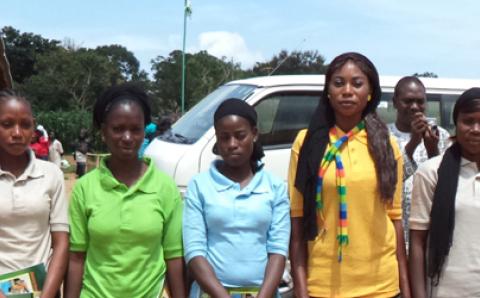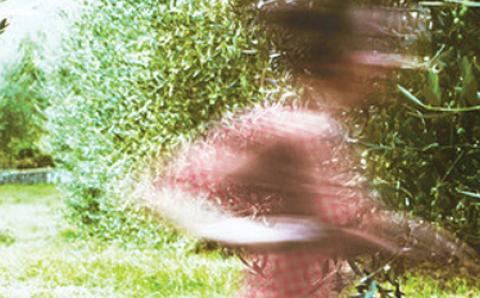Otto Selles had an opportunity to interview Evan Koons, who starred in and is one of the writers of the FLOW series.
Q. How did this project begin?
A, The idea for For the Life of the World (FLOW) began while producers Stephen Grabill and Brett Elder were creating theStewardship Study Bible(Zondervan) a good while ago. That’s where the initial ideas and theological tenets were developed.
Q. What is your background in writing and the arts?
A. I have been writing, acting, producing, and all points in between in film and video since 2003. I was mostly writing commercials and promotional stuff, with occasional creative personal projects. My first larger project wasExcept for Six, a feature-length documentary about hospice care in 2006. Working with Hospice of Michigan, we followed three families through their hospice experiences. It was a soul-shaping project, to say the least.
After that, I continued writing and copywriting, acting, and producing and also started teaching at Compass College of Cinematic Arts.
Q. Evan, are you just like the Evan who is the narrator of the series? Attracted to abstract thought, but needing concrete, artistic, and even zany illustrations to understand a concept?
A. I wouldn’t say “just like.” That Evan is who I would want to be . . . especially the letter-reciting Evan. He seems like a great guy who can think clearly, synthesize all the church’s and world’s trouble and boil it down to 90 seconds of beautifully scriptural inspiration. Yeah, I’d love to be that guy.
More than not, I’m just an awkward guy who struggles to live up to the things I believe in.
But yes, I do like thinking abstractly . . . it makes me a horrible interview. And I love when there’s a perfect metaphor, no matter how weird or zany, that can help ground those thoughts.
Q. The series centers on the term oikonomia, which is described in the first episode as meaning “God’s economy of all things.” Could you unpack that idea? It’s a bit Greek to me.
A. Ha! Yeah, truth be told I’m still figuring out what it means too. Right now, I see oikonomia as God’s song for all of creation. It’s like there’s a tune God is playing in everything and he wants us to harmonize with it. If that tune had a name it would be “All Is Gift.”
In a very 30,000-foot approach, FLOW is about reminding Christians of God’s song and inspiring them to tune their lives to it.
Q. How does oikonomia then relate to the different virtues each episode presents, such as love or justice?
A. OK, let’s look at love. But be warned, this might get a little abstract. And for sure, the best answer I could give would be to just go watch the series. Everything I try to do to explain oikonomia’s relationship to love will be inadequate compared to the films. But here it goes:
In FLOW, we generally start each episode highlighting the “exiled” perspective of a particular virtue or sphere of life. In the case of love, we tend to view it as something that gives us something. We “love” if something fulfills us, makes us happy, makes us complete. These are not bad reasons to love, it’s just incomplete. There’s more to the story than that. Exploring the “more” is a big part of what FLOW is about.
So what is God’s bigger picture when it comes to love? In FLOW, we look at the nature of God himself. It’s pretty safe to say that God is love. But what does that look like? Well, God is three-in-one. Right there, that tells me that love is mysterious. It’s communal. In it there are diversity, unity, perfect harmony, collaboration, offering—all of those things. And if we look at Genesis 1, we see that love acts; it creates and makes for no apparent reason whatsoever . . . other than to make more.
With love, there is an outpouring of abundance. If we look further into God’s story, we find that love is always pouring itself out, always gifting itself for life and abundance. Consider John 3:16: God so loved that he gave. . . and for what? For life. It is in this part of the story too that we see love is also about sacrifice, emptying ourselves out for another. Love is always pointed outside itself.
From there, we take a 30,000-foot approach to what that means for us as Imagebearers in exile. What does it look like for us to be pointed outside of ourselves? What does it look like to be an offering? What does it mean to live into a mystery? How do we love through our brokenness more fully and reflect God’s love in the world around us?
OK . . . now imagine all that in funny and beautiful moving pictures, with illustrations, dancing, manure, interviews, and good music. That’s how FLOW connects oikonomia and love.
Just go watch the series.
Q. Could the series be viewed as an introduction to a Reformed worldview?
A. Absolutely. It could be an introduction to any Christian worldview. Accompanying the series, we have primers for a bunch of denominations: Baptist, Pentecostal, Wesleyan, and Reformed. Fast fact: the writing team consists of an Anglican, Catholic, Protestant (me), and Evangelical. The scholars and laypeople in the film are from the Orthodox, Catholic, Protestant, and Evangelical traditions. Many colleges, from Calvin to Regent to Trinity and Wheaton, are using it in their classrooms today.
In regard to “worldview,” though, I think I’ve got some ‘splaining to do. For us, FLOW is about seeking to develop a new world picture. The use of metaphor is paramount in making Christian teaching "sticky" in our lives.
World pictures, metaphors, help truth get "legs" in our lives. They fight against the horrible Enlightenment legacy (individualism and reason) of dividing fact and value, theory and practice, doctrine and morals. All that stuff has really done a number on us and kept us in our heads for far too long. We never used the word “worldview” once in FLOW. I think a lot of people are tired of it. And maybe that’s because too much worldview thinking is just that, more thinking and less theologically informed doing.
Don’t get me wrong, worldview formation is important and even necessary, but it’s not enough to make a real difference in the world and in the church. A lot of the students I’ve come across already think so. I see that in their faces when they roll their eyes and even cringe at the mention of “worldview.” It’s not enough to simply “know.”
So that was a big part of FLOW, through metaphor and world pictures, to rekindle the Christian imagination. Let that image of a kindled imagination sink in for a minute. The goal of FLOW is to rekindle the Christian imagination so that we, as God's people, can see in a new way, for a new time, what God wants to accomplish in and through us. That all begins when we put on “new eyes.”
I’ll put my soapbox away now . . .
Q. Each episode is full of humor. What is the “economy of humor”? How does it help find the deeper mystery of faith?
A. The “economy of humor,” that’s good. I like that. I need to think more about it. Humor is a trickster. By it’s very nature it lowers our guard, it’s gratuitous. I mean, laughter is a giant waste of time . . . but it’s restorative, redemptive. In a way it’s a lot like tears or lament too. I think one of the things that humor does is allow us to laugh at ourselves, our brokenness, our mistakes. It surprises us. Maybe it’s a form of grace. Through it, we become more receptive to things—ideas, other people. It creates commonality, unity.
I don’t know, maybe humor doesn’t help us find the deeper mystery of faith. Maybe it’s actually part of the deeper mystery of faith . . . and maybe it’s a way less threatening and scary doorway of that deeper mystery.
I need to think more about it. If/when there’s a FLOW 2, I’m going to fight to explore it in an episode. Ironically, it’ll probably end up being the saddest episode of the bunch. Were I a betting man, I’d wager that humor is actually suffering in disguise.
Q. A number of times during the series a pragmatic, utilitarian approach to life is criticized as one of the main obstacles to living a deeper life. Why is that?
A. Being pragmatic and utilitarian, I don’t think are bad things, or things to be too critical of. They help us make good decisions with the information and time we have. Let’s get real for a second: there’s just too much to do these days! In a lot of ways being pragmatic is good stewardship as it allows us to discern life in a crazy and hectic world.
But for many of us, it stops there. There’s more to the story.
Was God being pragmatic and utilitarian when he created everything or when he chose to bless a barren woman and elderly man? Were the 12 disciples the best choices (in our understanding) to build the church? Are truth, goodness, and beauty only beneficial for what they do for us? When God created, did he finish off each thing by saying, “And it was purposeful and for a reason and fits nicely into the machine of existence I’ve created.” No. He said, “It is good,” in and of itself, not for its benefits.
Pragmatic and utilitarian mindsets can cloud our minds about the inherent goodness of people and things in and of themselves, not just for what they do for us. The brokenness of pragmatic and utilitarian approaches is that it puts trust and hope in ourselves to make decisions based on what we think, want, trust, and hope for,
Q. The series profiles some truly cool people, such as civil rights leader John Perkins and the artist Makoto Fujimura. Is it fair to say they are presented as models of Christian living?
A. I’d say Fujimura and Perkins are good examples of what it means to bear God’s image in the world. They are wise counsel. Their approach to life, who they are, how they work and pursue their callings ought to make us take note. They offer perspectives, different ways to see the world based on their knowledge and experiences.
Fujimura and Perkins, they live lives that don’t trust in their own understanding. They offer themselves to God in full confidence that he will make a way; he has a plan that involves everything . . . that plan involves more than just them. It’s generational. It’s eternal. They help us see how God is using everything and how everything and everyone is a reflection of God.
So I think Fujimura and Perkins are good examples of the ever-growing list of saints demonstrating faith in action.
Q. The series references literary writers like Hopkins and Hugo, along with various thinkers and theologians. However, its use of irony gives the series a very strong contemporary, pop-culture feel. What films and TV shows influenced you and the team behind the series?
A. Praise the Lord, an easy question. We grew up with Mr. Rogers and Sesame Street and Pee-Wee’s Playhouse. Those were big influences. There was song and dance in almost all of those shows. We also grew up with Christian media, so there was a soft spot in our heart for shows like McGee and Me.
RadioLab a radio program on NPR was another big influence for us. We all are avid listeners and love the wonder and respect they have for the universe. We love their dedication to telling mesmerizing stories and how they work to affect all our senses in the stories they tell. They care about their audience. Their radio shows are full-body experiences. We also like Terrence Malick films and PBS documentaries.
Music played a huge role in making FLOW too. Usually when making a film you score after you have your film edited. We approached Jars of Clay while we were still writing and gave them the theological underpinnings of FLOW, and that was about it. What they brought back to us pretty much blew our minds and continued to influence how we wrote. All of us writers are musicians and we listen to a lot of music, so that helped us establish tone, timing, and pacing. There was always a guitar or banjo or ukulele around to fiddle with and get distracted by.
Q. In contrast to the somewhat wild and crazy moments, the series has many beautiful shots. I imagine that was meant to underscore the importance of beauty, of beholding, of being “useless”?
A. Yep. Our goal throughout all of FLOW was to rekindle the Christian imagination, re-enchant churches. I heard Peter Kreeft speak not long ago and he said, “We have no defenses at all against beauty . . . the heart is as weak as butter and doomed to fall in love with whatever it sees smiling at it.” So that was the goal, if we could reveal God’s gracious smile, his gratuitous wonder and beauty, his abundant whimsy and splendor, coursing through everything, we knew we would reach our audiences.
Useless . . . I like that word too. It’s a tough word to swallow, not at all pragmatic or utilitarian, and in many ways it’s exactly what everything is . . . it’s gratuity, grace.
Q. The series is quite optimistic about the role of Christians and the church to help the world flourish. Yet the news today is not very encouraging, with beheadings abroad and racial violence at home. Would it be more realistic to hold a dimmer, “sin and misery” view of the world?
A. It’s absolutely realistic to hold a dimmer view of the world. That’s part of the gospel story. A question we raise a lot in FLOW that’s applicable to this view is “What’s it for?” or maybe “What’s it about?”
FLOW’s response would be simple and terrifying: enter into the sin and misery, be present in it, make yourself an offering to the sin and misery in all that you do. This was Jeremiah’s call to the Israelites heading into exile in Jeremiah 29: make homes, build families, work well and with excellence, and also seek the peace and prosperity of your neighbors (in the city you’ve been placed), for when they prosper, you too will prosper.
In a sense, we are separated from God, exiled. It’s a form of hell. In many ways, I can look out my window and cry, “My God, it’s hell out there.” But I must always remember that I am bound to Christ, sucked up in his slipstream. He tells me that the kingdom of God is within me. Whoa. If that’s true, I better start showing up to the hell around me.
I’m reminded of Frederick Buechner’s quote, “Here is the world. Beautiful and terrible things will happen. Don't be afraid.”
All that said, it can be really easy to turn this series into one giant “kumbaya” moment, where we all hold hands, and hug and talk about the power of Love and God’s wonder. My hope, though, is that churches will live out what they learn from FLOW in their communities. Entering into “sin and misery” is more than difficult. It makes you vulnerable. It brings with it suffering, sacrifice, and heartache—and this is also what it means to be “the body of Christ” in the world. The truth is: living out FLOW’s stories in your own life are far from “Kumbaya” experiences. They’re messy, mysterious, and heartbreaking.
Hopefully the series inspires audiences to the bigger picture of God’s sovereignty. Hopefully it reveals and affirms the reality of God’s image in all of us. Hopefully it allows us to more fully hope and trust in him.
Q. What is your current project?
A. There’s always stuff in the hopper. Apart from heading up FLOW’s social media and blog and going around to churches and groups chatting about FLOW, I’m working with GORILLA (wearegorilla.co). They are the production company behind FLOW. They are living out FLOW’s stories, God’s oikonomia, in the entertainment industry. Together we’re gearing up to shoot a feature film this summer. It’s a comedy called Camp Manna, and it’s a story of faith . . . and Christian summer camp. I’m pretty biased, but it should be really good.
Q. If I put in my review a sentence like this: “With his beard, ukulele, and Abraham Kuyper T-shirt, Evan Koons is the epitome of a CRC hipster,” would you be OK with that?
A. If I could find one solid definition of what a hipster is—or maybe one that I liked—I’d be OK with that. Unfortunately, I can’t find one. Is hipster a style? An attitude? Is it both? I’m not really sure. So, I guess I wouldn’t really classify myself as a hipster. I mean, I do have a penchant for the ironic, but I don’t think I qualify for a bunch of reasons:
- I’m too old.
- I have a beard because my wife likes it and because I look like I’m 12 years old if I don’t.
- I’ve been buying clothes at thrift stores since the 90s because my high school had a dress code and wearing a collared “Subway” shirt was more fun and subversive (and less expensive) than wearing traditional dress-code apparel. I wear thrift shop clothes today because I have kids and I’m poor.
- I hate skinny jeans. I hate, hate, hate, hate them. I call what I wear on my legs “jeans.”
- I don’t really care about being “cool.” I think my work in“Coffee with Jesus” and my FLOW blog videos are proof of it.
- I started getting tattoos in the 90s . . . does that count? And more than half of them are really lame and regrettable.
- I’m just way too goofy looking . . . like Waldo from Where’s Waldo, but with a weird beard. Is he a hipster? I don’t think so.
- I’m in the market for a minivan.
About the Author
Otto Selles teaches French at Calvin College, Grand Rapids, Mich., and attends Neland Avenue Christian Reformed Church in Grand Rapids.








